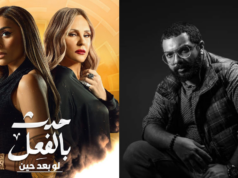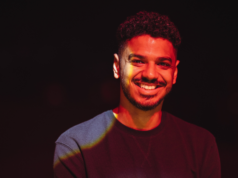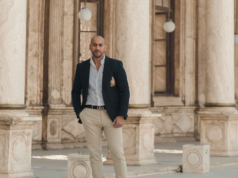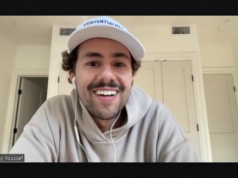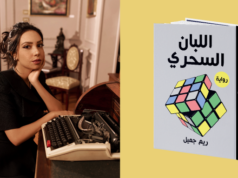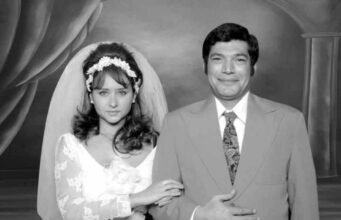From the minute we stepped into Sharmoofers’ studio, the fun has begun! We were greeted by their two goofy dogs, Folla and Mickey, who also used our arrival as an excuse to sneak outside and dig up a fat hole in the garden, sending everyone running to save what can be saved. Loud laughter from everyone and excited barks from the two dogs all set the tone for the whole meeting. It was only one day before their scheduled shoot with Identity, and their excitement was radiating and infectious.
Sharmoofers gained exposure following the release of their big hit single ‘Khamsa Santy’ in 2014; since then the award-winning band has been moving from one success to another. Their music spreads happiness and sends positive vibes flying in the air whenever you hear them; that’s their secret charm.


After losing a couple of ping pong games to the band members, we sat down with lead vocalist, composer and songwriter Ahmed Bahaa, and composer and bassist Moe El-Arkan, and we talked music.
Let’s get into the song-writing and composing process. How does the process begin, and how does the final song take shape?
Moe: We literally have no rules. Sometimes Bahaa would begin a vocal line, then I would join in, synchronise a beat to it and we get going. Some other times, I would be building up a beat and then Bahaa would add a vocal melody. Or during our free flowing sessions, we would be jamming and then come across a music line that we like, so we go from there. We don’t have a specific approach.
Bahaa: The topics depend on how we are feeling at that time, and usually our emotional states are so close. I don’t know if it’s by luck, or we pick up each other’s mood. It’s almost telepathic. Sometimes we are in a happy mood, so the song will be full of positivity. Other times we start to ask ourselves questions like, what concept would we want to discuss, or what is the core message the song must deliver? How will the message be expressed? Based on the answers to these questions, I start the writing process. There is nothing fixed, even the way we come up with topics. Sometimes I like the sound of a vocal line and the meaning behind it, so we create a whole song around it.
You have mentioned in more than one occasion that Bobby McFerrin is an inspiration to both of you. McFerrin is well known for his interactive concerts, where he orchestrates the audience to sing a whole song while he plays to their accompaniments. Do you think such a concert could take place here in Egypt? Would you want to do that in yours?
Moe: To reach Bobby McFerrin’s level in concerts, where you break down the line between the performer and the audience, it requires a specific ambience. The venue has to suit the need of the concert’s energy and the audience has to have a heads up of the experience they will go through; it will demand the creation of a certain mood. But this experience is worth all the sweat, because there are better feelings the audience can taste other that just applauding and cheering. The events that evoke strong emotions tend to be remembered better.
Bahaa: Also, the safety of our audience is our priority. We have to pick which concert, which audience can handle this type of experience. Every kind of concert has its rituals. We are well aware that the first time in a concert can bring out a certain type of adrenaline. If we know that the majority of the audience has never been to a concert before, we have to be careful. But if the majority are people who have been to many concerts before, we can play those types of games with. Moreover, the Egyptian audience is in constant evolution. A decade ago, in the music scene in general, it was next to impossible to have the audience clapping to the beat of a song. It used to be chaotic. As for now, people interact in a much better way. So, yes I guess the Egyptian audience will one day maintain this kind of discipline.


Tell us more about your new single, and your next project.
Bahaa: Our newest single is called ‘Moftaked El Habibah’. It is the first emotional song for Sharmoofers. We can’t interpret the fan’s reaction to the song. Some people don’t like our music because it’s hard beat, and they want the lyrics to be more serious. The song is not that deep, but it’s relatable. It’s based on personal experiences, and the music is chilled and unrushed. We have been working on it for over a year and a half. Also in the song’s video clip, we will record live violin music. It’s a first for us, so I won’t lie to you I am a bit nervous.
Moe: Bahaa plays the role of the worrier in our band when it comes to music, but in real life this is my role. He is the bold one. We’re also working on a new album that will come out next summer. It is so distinctive. It will be called after a psychological disease like our previous album ‘Paranoia’. The idea behind the album is that in this era, everywhere in the world everyone suffers from stress, anxiety, grief… And we want to address this undeniable issue through our songs.
In your songs’ music and lyrics, you are being purely who you are. Why is it so hard for people to be themselves? How can we liberate from the fear of being who we are?
Bahaa: In a world where we’re judged the moment we walk through the door, it is indeed a hard thing for someone to be him/herself. There are stereotypes that people often follow, and when you don’t follow the crowd and you try to use your own mind, you will be judged and ridiculed. The generation gap between parents and their children is also an important factor in this issue. The age difference between our generation and our parents’ is roughly 25 years and that is a long period of time. During this entire time, there were so many technological advancements, educational opportunities and society up-gradations that there is bound to be a difference in thinking and opinions between the two generations. Lots of parents don’t allow their sons and daughters the opportunity to be themselves or be different out of fear for them. So in order to protect them, they robbed them out of their freedom of making their own decisions. As a result, when the children have the chance to do what they want, it usually happens in an unhealthy and weak act of rebellion; like a guy growing long hair because he knows his parents won’t approve, or a girl doing body-piercing or having a tattoo…
Moe: My parents expressed their fear when I decided to drop college and play my music, but they still supported my decisions because they know that this is my life. Parents are bound to want to protect their children, but they have to keep in mind that we are all different from one another, so support your children to be unique and not just going with the flow.
As for how to liberate yourself from the fear of being who you are, I succeeded in doing just that when I noticed that when I am really being myself in our songs people are happier, and can relate to what we are presenting to them. So I decided to keep on doing just that, and I didn’t spare a single thought to anything else.


The lyrics of your songs address the Egyptian audience; don’t you think this can get in the way of expanding to the Middle East or internationally?
Moe: We counterbalance that with our music. The tunes and melody lines of our songs are not Egyptian. Let’s take a song like ‘Despacito’ for example. It is a song by Puerto Rican singer Luis Fonsi featuring Puerto Rican rapper Daddy Yankee, and it’s in Spanish. Despite all that, it succeeded worldwide and became the biggest hit of 2017. We can add many songs to this list, like ‘Gangnam Style’ by the South Korean musician Psy, and ‘Alors On Danse’ by the Belgian musician Stromae. We all love these songs even though we don’t speak these languages. It’s the music that moves the listener by communicating feelings and moods. Music can travel through the barriers of language and culture; lyrics can’t do that all the time.


There is freedom in your songs; it’s not verse–chorus, verse–chorus. Do you aim to change the song’s structure or it just happens?
Bahaa: It just happens. If the song came out in a certain way, we leave it as it is. If while composing a song or rehearsing, a tune line or a vocal line popped into our heads we use it. We could change a part in the song in order for it to fit or we could even take it and start a whole new song with it, forgetting all about the song we were working on in the first place. It’s messy. We are aware of that but this spontaneity could give birth to five new songs or even more, so why would we want to give up on that?
The theme of our issue this month is “The Road to Success”; what do you think are the keys to success?
Moe: Be true. Believe in what you do. Work hard. No regrets.
Bahaa: Failure is an essential key to success; it helps you grow into a better version of yourself. It is impossible to live without failing at something, and if you kept on stepping back from your dreams because you’re afraid to fail then you will achieve nothing, which means you failed life by default. So take risks, learn from your mistakes, and remember that for every up there is a down.





